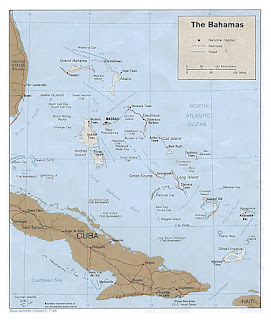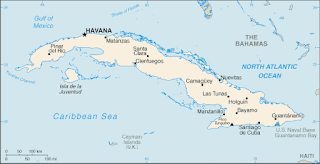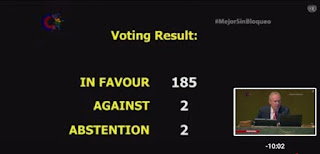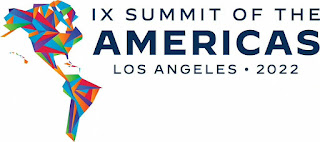The U.S. blockade against Cuba is not just an economic measure - it’s a violation of human rights and international law
The U.S. Blockade on Cuba: A Humanitarian Catastrophe Fueled by Geopolitical Arrogance
By Dr. Kevin J Turnquest-Alcena
“Deo adjuvante, non timendum”
"With God as my helper, I have nothing to fear."
This Latin phrase beautifully encapsulates the unwavering spirit of the Cuban people in the face of the relentless U.S. blockade. For over six decades, Cuba has endured an economic siege meant to cripple its progress and suppress its people. Yet, the Cuban people, bolstered by faith and resilience, remain defiant. The blockade is more than an economic imposition—it is an affront to human dignity. But with God’s help, as the phrase assures, no challenge is insurmountable.
Another Latin phrase, "In necessariis unitas, in dubiis libertas, in omnibus caritas", meaning “In necessary things, unity; in doubtful things, liberty; in all things, charity,” reminds us that when faced with global crises, unity and empathy are essential. The blockade against Cuba stands in stark contrast to this principle, as it continues to isolate the country instead of offering solidarity and support.
A Policy of Economic Strangulation
The blockade has turned Cuba into an isolated battlefield where economic deprivation is used as a tool to crush the human spirit. From March 2023 to February 2024, Cuba suffered over 5.05 billion USD in losses, while the cumulative losses over six decades exceed USD 164 billion. Losing 14 million dollars per day. These figures reflect not just monetary deficits but lost opportunities for economic growth, healthcare, and education.
As the Latin phrase goes, "Aegroto dum anima est, spes est", or “While there’s life, there’s hope.” Despite these overwhelming numbers, Cuba’s hope lies in the resilience of its people and their unwavering determination to resist. However, the blockade stifles their potential, prevents access to vital resources, and plunges the nation into deeper economic and social crises.
The Healthcare Crisis: The Human Cost of Sanctions
Perhaps nowhere is the cruelty of the U.S. blockade more evident than in Cuba’s healthcare system. Once a global leader in providing high-quality, free healthcare for all its citizens, the Cuban health sector has been crippled, not by internal inefficiencies, but by U.S. sanctions that have blocked essential medical supplies and technologies.
“Vincit qui patitur,” meaning “He who endures, conquers,” illustrates the enduring struggle of Cuba’s healthcare workers and patients. They fight on despite the severe limitations imposed on them. The COVID-19 pandemic exposed this harsh reality even further. The U.S. blocked Cuba’s access to ventilators, preventing the island from importing life-saving equipment at the height of the pandemic.
This policy has moved beyond economic sanctions to the point of moral bankruptcy. By denying Cuba critical medical resources, the U.S. blockade transforms Cuba’s once-proud healthcare system into a casualty of geopolitical arrogance, leaving the most vulnerable citizens—children, the elderly, and the sick—without the care they need.
Food Insecurity and Education: Starving a Nation’s Future
In education and agriculture, Cuba is similarly stifled. The Cuban government reports that due to the embargo, shortages have impacted over 437,000 school uniforms for the 2023-2024 academic year. Basic educational tools such as textbooks, computers, and school supplies are increasingly scarce. Agriculture is no better off. Deprived of fertilizers, pesticides, and modern machinery, Cuban farmers have seen crop yields drop by 40%, which has led to food insecurity, especially among the nation’s most vulnerable.
Here we find relevance in the Latin phrase, "Veritas vos liberabit", or “The truth will set you free.” The blockade is not merely an economic restriction—it is a violation of human rights. The truth is that Cuba’s children, farmers, and educators are unjustly caught in the crosshairs of geopolitical gamesmanship. It is not only the Cuban government that suffers; it is the Cuban people, whose rights to education, food security, and health are being systematically denied.
A Violation of Human Rights and International Law
The U.S. blockade is not just an economic measure—it’s a violation of human rights and international law. Numerous international bodies, including the United Nations, have condemned the U.S. for its unilateral coercive measures, which disproportionately affect Cuban civilians.
“Fiat iustitia, ruat caelum”—“Let justice be done, though the heavens fall”—should resonate globally in the face of such egregious actions. The Cuban people are not alone in their call for justice; the international community has, time and again, voted overwhelmingly in favor of ending the blockade. However, the United States continues to ignore this global outcry, leaving Cuba isolated and under siege.
Biblical history also reminds us of the cycle of suffering and liberation. Like the Israelites who were freed from Egyptian oppression, Cuba’s time of liberation will come. Just as God delivered His people from bondage, we must believe that the Cuban people, too, will see an end to their suffering.
Lessons from History: Global Empathy and Responsibility
History teaches us that no policy of oppression goes unpunished. As Mahatma Gandhi wisely said, “The future depends on what we do in the present.” Just as leaders like Nelson Mandela, Voltaire, and Desmond Tutu fought against systems of oppression and inequality, so too must we stand up against this blockade.
The Bible reminds us in Galatians 6:7, “For whatever one sows, that will he also reap.” The United States must recognize that sowing seeds of deprivation and suffering will only lead to more hostility, division, and unrest. If we wish to sow peace, prosperity, and goodwill, we must begin with lifting this unjust embargo.
A Way Forward: A Call for Unity
The solution lies in the principle that the world is one family—"Una familia sumus"—“We are one family.” The Bible teaches that we are all part of one body, and when one part suffers, we all suffer. Cuba’s struggle is not just theirs alone, but a shared burden for humanity to address. To lift the blockade is not merely a political decision; it is a moral imperative.
In 1 Corinthians 12:26, we are reminded that “If one part suffers, every part suffers with it; if one part is honored, every part rejoices with it.” The world must act in unity, recognizing that the pain of the Cuban people is a call for collective empathy and action. With over USD 14 million lost in health investments due to the blockade, thousands of Cubans are deprived of life-saving care. Ending the embargo will not just restore Cuba’s dignity but will reaffirm the global commitment to human rights, justice, and equality.
1. Immediate Removal of Cuba from the State Sponsors of Terrorism List
This designation is arbitrary, politically motivated, and has no basis in reality. As Secretary of State Antony Blinken himself acknowledged in 2024, Cuba does not sponsor terrorism. Removing Cuba from this list would not only correct a grave injustice but also facilitate financial transactions and investments necessary for the country's recovery.
2. Lifting the Blockade
The blockade’s repeal is the most direct and necessary step toward justice. The blockade violates international law, as recognized by numerous U.N. resolutions, and constitutes a form of collective punishment against the Cuban people. The Biden administration has the executive authority to make substantial changes, as seen in previous administrations, but Congress must ultimately act to end this outdated policy.
3. Humanitarian Cooperation
The pandemic has shown the interconnectedness of global health. By lifting the blockade, the U.S. could engage with Cuba’s robust biotechnology and medical sectors to foster collaboration that benefits both nations. Cuba’s COVID-19 vaccines and medical personnel have received international acclaim, and cooperation in this area would bolster global health efforts and restore goodwill between the nations.
4. Re-establishing Trade Relations
Once the blockade is lifted, Cuba could re-enter the global market on fair terms, allowing it to import vital goods at competitive prices and export its world-class medical and agricultural products. This would stimulate both Cuban and U.S. economies, particularly in sectors like biotechnology, pharmaceuticals, and tourism.
5. Encouraging Tourism and Cultural Exchange
The normalization of travel and tourism is a significant step toward reconciliation. Cuba has much to offer, from cultural richness to natural beauty, and a restored flow of U.S. visitors would provide much-needed economic relief. Furthermore, the lifting of travel restrictions would enable Americans and Cubans to engage in the people-to-people diplomacy that fosters mutual understanding and goodwill.
A Moral Imperative: The Role of Global Civil Society
The global community, particularly civil society organizations, religious groups, and human rights advocates, has a crucial role to play in ending the blockade. The voices calling for justice must grow louder and more unified, especially in nations allied with the U.S. These organizations must continue to pressure governments, share stories of the blockade’s human cost, and push for diplomatic resolutions that reflect humanitarian values.
As citizens of the world, we cannot remain silent in the face of such widespread suffering. The Cuban people deserve the opportunity to build their future without external hindrance. To echo the words of Archbishop Desmond Tutu, “If you are neutral in situations of injustice, you have chosen the side of the oppressor.” Global citizens must remain engaged, advocating tirelessly for the end of this unjust blockade.
Faith and Resilience: A Testament to Endurance
As the Latin phrase "Per aspera ad astra"—*"Through hardships to the stars"—*suggests, the Cuban people have faced incredible adversity, yet continue to reach for the stars. Despite the blockade’s severe economic, social, and humanitarian impacts, Cuba has developed world-class education, healthcare, and cultural systems. This resilience, deeply rooted in faith and a strong sense of community, has allowed the Cuban people to endure challenges that would have crushed less determined nations.
In the words of the late South African leader Nelson Mandela, "It is said that no one truly knows a nation until one has been inside its jails." While the Cuban people are not in physical jails, the blockade has created an economic prison, limiting their access to the world and its opportunities. Yet, like Mandela, the Cuban people remain hopeful, faithful, and resolute.
A Future Without Fear
"Deo adjuvante, non timendum"—"With God as my helper, I have nothing to fear." This powerful statement embodies the spirit of the Cuban people, who despite the hardships imposed upon them, continue to stand firm in their faith and hope for a better tomorrow.
The end of the U.S. blockade would not just be a political victory; it would be a triumph of human dignity, justice, and the resilience of the human spirit. The Cuban people have shown that, even under the harshest of circumstances, they can innovate, persevere, and thrive. But they should no longer have to struggle under the weight of such an unjust policy.
The world must continue to support Cuba’s call for the blockade’s end, not only as a matter of economic necessity but as a moral imperative. Justice demands that the United States acknowledge its mistake and move toward a future of peaceful coexistence, mutual respect, and shared prosperity.
The words of the Cuban poet José Martí ring especially true: "La libertad no es negociable"—"Freedom is not negotiable." The Cuban people deserve the freedom to live without fear, without restrictions, and without the yoke of an economic blockade that has caused so much unnecessary suffering. May we all join in the call for justice, remembering that with faith, perseverance, and the support of the global community, no challenge is insurmountable.
The International Call for Solidarity
The international community's overwhelming support for ending the blockade reflects a shared belief in justice and human rights. Year after year, the United Nations General Assembly has passed near-unanimous resolutions calling for the lifting of the blockade, with only a few nations standing in opposition. These resolutions represent a collective voice, affirming that the blockade is not only an American-Cuban issue but a global one that affects international law, trade, and humanitarianism.
Organizations like the Non-Aligned Movement, the Group of 77, and many civil society groups across the globe have continued to express their solidarity with Cuba. Countries in Latin America, Africa, Europe, and Asia have called for the blockade’s end, recognizing the harm it has caused not only to Cuba but also to their own citizens and companies that have faced penalties for engaging with Cuban entities.
Even within the United States, growing numbers of politicians, activists, religious leaders, and businesspeople are advocating for a change in policy. Recent polls indicate that a significant portion of the American public, including Cuban-Americans, favor normalizing relations with Cuba and lifting the restrictions that have long outlived their Cold War rationale. The time is ripe for the U.S. government to listen to its people, as well as the global community, and move toward constructive dialogue and cooperation with Cuba.
Economic Justice: A Key to Sustainable Development
Lifting the blockade would open doors to economic opportunities that have been denied to Cuba for decades. The country’s potential for growth, innovation, and integration into the global economy is vast. Cuba’s biotechnology and pharmaceutical sectors, already recognized for their achievements despite the blockade, could expand further with access to international markets and partnerships. The island’s strategic location in the Caribbean also positions it as a potential hub for tourism, shipping, and trade.
With the blockade lifted, Cuba could attract foreign investment, which would contribute to rebuilding its infrastructure, modernizing its industries, and creating jobs for its people. It would enable the country to import essential goods at competitive prices and export its products, from medicines to agricultural goods, to the world. The Cuban economy would flourish, benefiting not only its people but also regional and global markets.
Moreover, U.S. businesses, particularly in sectors like agriculture, technology, and tourism, stand to gain from open trade with Cuba. American farmers could sell their goods to the Cuban market without the restrictions that have cost them millions in potential revenue. U.S. companies could invest in Cuban industries, fostering mutual economic growth and innovation.
A Path Forward: Diplomacy Over Division
The path forward lies in diplomacy, not division. While political differences between the U.S. and Cuba remain, they should not prevent constructive engagement. Countries with far greater ideological differences have found ways to coexist and collaborate on issues of mutual interest, and Cuba and the U.S. are no exception.
Diplomacy requires respect for sovereignty and an understanding that imposing punitive measures harms both nations. The U.S. can work with Cuba to address shared challenges, from climate change to public health, while respecting Cuba’s right to chart its own course. Cuba, for its part, has repeatedly expressed a willingness to engage in dialogue and cooperation on equal footing, and this openness should be met with reciprocal goodwill from the U.S. government.
The road to lifting the blockade will not be easy, but it is a necessary step toward a more just, peaceful, and prosperous future for both nations. As global citizens, we must continue to advocate for policies that promote dialogue, reconciliation, and mutual benefit, rather than division and hostility.
Conclusion: Building Bridges, Not Barriers
In closing, the U.S. blockade against Cuba is not just a relic of a bygone era; it is an ongoing injustice that must be rectified. The economic, social, and humanitarian toll it has taken on the Cuban people is immense, and the moral case for ending the blockade is irrefutable. Cuba deserves the opportunity to thrive, to engage freely with the world, and to shape its own future without external interference.
"Per aspera ad astra"—through hardships to the stars—remains an apt description of Cuba’s journey. Despite the blockade’s many challenges, the Cuban people have shown remarkable resilience, creativity, and solidarity. They have persevered, not out of fear, but out of hope for a better future.
It is time for the United States to honor that hope by ending the blockade, allowing Cuba to flourish as a free and sovereign nation. It is time for the international community to continue raising its voice in solidarity with Cuba, demanding an end to this unjust policy. And it is time for all of us, as global citizens, to remember that with faith, perseverance, and a commitment to justice, we can overcome any obstacle.
The world will be watching, and history will judge the actions taken in this critical moment. Let us all work toward a future where walls of division are torn down, and bridges of cooperation are built, ensuring that the Cuban people, like all people, can live in peace, dignity, and prosperity.
References:
• Cuba’s Report Under United Nations General Assembly Resolution 78/7 Entitled “Necessity of Ending the Economic, Commercial and Financial Blockade Imposed by the United States of America Against Cuba,” July 2024.
• United Nations Human Rights Council Special Rapporteur, "The Negative Impact of Unilateral Coercive Measures on the Enjoyment of Human Rights in Cuba," A/HRC/54/23.
• "United States: Unilateral Designation of States as Sponsors of Terrorism Negatively Impacts Human Rights," United Nations Office of the High Commissioner for Human Rights, 2024.
Source









